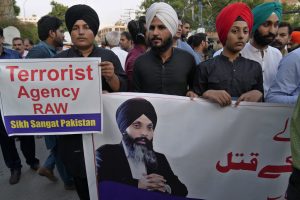Leaked documents that the online non-profit news organization, The Intercept, obtained from Pakistan support Canada’s claims about an Indian assassination program. These classified documents also shed light on the threats posed by India’s external intelligence agency, the Research and Analysis Wing (RAW) to Pakistani nationals.
According to these intelligence reports, RAW is suspected of collaborating with regional criminal networks and dissident groups to carry out targeted assassinations and other attacks within Pakistan’s borders and beyond.
According to intelligence documents cited in The Intercept investigation, “RAW is targeting individuals and religious institutions alleged to support an armed insurgency in the disputed territory of Kashmir, as well as militant Sikh activists living in Pakistan and wanted by the Indian government.”
The alarming increase in attacks against individuals wanted by India inside Pakistan in recent months further strengthens these claims.
In recent weeks, a number of individuals associated with the Kashmir struggle and Sikh leaders advocating for an independent Khalistan state within India have lost their lives. These killings have taken place across various cities across Pakistan, including Karachi, Lahore, Islamabad, and Rawalakot in Kashmir.
Muhammad Riaz, also known as Abu Qasim Kashmiri, was shot and killed in September at a mosque in Rawalakot by an unknown individual due to his reported affiliation with Jamaat-ud-Dawa (JuD), an Islamist organization that India claims was responsible for the 2008 Mumbai murderous attacks that claimed 166 lives. According to reports, Riaz’s death is the third incident of this kind to occur in Pakistan this year.
What makes these murders even more alarming is the accelerated pace of allegations made by Pakistan against India. Pakistani authorities have been asserting that is RAW responsible not only for these killings within Pakistan but also for others in Western countries.
The alleged involvement of India in the killing of Sikh leaders advocating for an independent Khalistan has drawn significant criticism from Western nations. A recent report by Financial Times highlights how U.S. authorities thwarted a conspiracy and issued a warning to India’s government regarding their suspected involvement in the assassination plot of a Sikh leader, who is a U.S. national.
This incident follows claims by Canada of “credible allegations” that India was responsible for the killing of a Sikh leader on Canadian soil. The magnitude of these allegations and the attention they have garnered from Western countries signify a shift in international perception of India’s actions.
In light of these developments, Pakistan hopes that the criticism from Western countries could potentially strengthen its own claims against India. This situation has created an atmosphere where these allegations are being closely monitored and analyzed, as they have far-reaching implications for diplomatic relations between various nations involved.
Speaking about the Financial Times report, Foreign Office Spokesperson Mumtaz Zahra Baloch not only denounced India’s purported attempt to kill a Sikh separatist leader, but she also reiterated that Pakistan has long been a target of state-sponsored terrorism and espionage. She claimed that “India’s network of extraterritorial killings and espionage has gone global” and that “international laws are clearly broken by India’s reckless and careless behavior.”
The ongoing criticism of India’s alleged involvement in killings has caught the attention of policymakers in Pakistan. They see this as an opportunity to strengthen their case against New Delhi’s alleged involvement in undermining Pakistan’s security, particularly through the targeting of Chinese nationals working on the China-Pakistan Economic Corridor (CPEC) and supporting Baloch separatists.
However, it remains unclear how the long-running territorial disputes between Pakistan and India could be impacted by the alleged killings of Sikh leaders in Western countries. Despite these allegations, the United States has historically turned a blind eye when it comes to Indian actions on Pakistani soil.
Nevertheless, Pakistani policymakers are hopeful that the international community will take notice of these alleged killings and consider them as evidence of India’s destabilizing actions. They believe that this could help garner support for their cause and bring attention to New Delhi’s alleged interference in their internal affairs.
Despite Pakistan’s continued protest, the incidents of alleged assassinations in Pakistan seem to have gone unnoticed on the international stage. Similarly, India’s alleged armed attacks inside Pakistan-administered Kashmir have failed to garner any significant attention globally.
Expectedly, Pakistan’s efforts to attract attention to its claims regarding alleged Indian involvement in assassination attempts may also go unnoticed. This can be partially attributed to the strong strategic ties between India and the United States, which make it challenging for Pakistan to sustain international attention on these matters.
In order to effectively raise these concerns on a global scale, Pakistan must make a compelling case supported by reliable evidence, bearing in mind that Islamabad’s case will be less persuasive to influential international forces due to its rivalry with India and both sides’ accusations of subversive activity in one another’s territories.

































